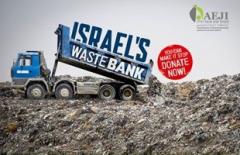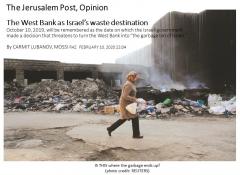Activity FieldsActivities of The Association of Environmental Justice in Israel
What is Israel' Waste Bank Story about?
No to turn the Good Samaritan site in the West Bank into ‘Hospitality’ of Jerusalem municipal Garbage. 5 main reasons why to Halt it Now:
Association of Environmental Justice in Israel (AEJI)
| Sunday, 31-May-2020
The Association of Environmental Justice in Israel (AEJ), NGO, non-profit, initiated activity already in October 2019 to stop the advancement of plan for the construction of a waste and energy facility in the West Bank nearby of Good Samaritan site.
The campaign is underway with legal tools, in Israel and the EU, at high costs and on a short schedule - and
we will thank you for joining this support and raising the required funds.
Please find below the Rational why to object the plan.
No to turn the Good Samaritan site in the West Bank into ‘Hospitality’ of Jerusalem municipal Garbage. 5 main reasons why to Halt it Now:
1.Environmental Justice – international accord
2.Social Justice – Budget Priorities
3.Environmental Pollution / Health Risks
4.World civilization heritage – The Good Samaritan site
5.Alternatives
Thanks:
The preparations initiated by the Association for Environmental Justice in Israel (AEJI) in order to lead and bring to halting of the Waste-energy facility plan that Israel promotes in the West Bank, and to initiate a discussion of sustainable alternatives based on principles of environmental justice, regional sustainability and respect of the international law cannot be accomplished without the help of partners in Israel, in Palestine The international community and we thank everyone for this. Special thanks to Prof. Dan Rabinowitz for assisting in the formulation process of professional activities, to Mossi Raz (former MK) for his valuable advise and support along the long way, to Fadwa for her strong partnership although our region obstacles, and to Dubi Moran for his assistance with editing of site maps, photographing beautiful pictures, support AEJI with all the technological challenges we face!
We will be happy for your Support and Donation to help achieve the goal.
the_waste_bank_story_5_reasons_1st_slide.jpg
Stop the Plan of Waste facility in West Bank _ The 5 main Reasons
the_waste_bank_story_1st_reason_environmental_justice.jpg
The 1st reason: Environmental Justice considerations
the_waste_bank_story_2nd_reason_social_justice.jpg
The 2nd reason: Social Justice considerations
the_waste_bank_story_3rd_reason_pollution_and_health_risks.jpg
The 3rd reason: Environmental Pollution and Health Risk
the_waste_bank_story_4th_reason_world_culture_heritage.jpg
The 4th reason: World culture Heritage- The Good Samaritan site
the_waste_bank_story_5th_reason_alternatives.jpg
The 5th reason: Alternatives!
The West Bank as Israel’s waste destination
Carmit Lubanov, Mossi Raz
| Monday, 10-Feb-2020
The West Bank as Israel’s waste destination
October 10, 2019, will be remembered as the date on which the Israeli government made a decision that threatens to turn the West Bank into “the garbage bin of Israel.”
By CARMIT LUBANOV, MOSSI RAZ
FEBRUARY 10, 2020 22:04
IS THIS where the garbage ends up?
(photo credit: REUTERS)
October 10, 2019, will be remembered as the date on which the Israeli government made a decision that threatens to turn the West Bank into “the garbage bin of Israel.”
Although operating as an interim government while the political system is on hold in anticipation of a third election within a few short months, the Environmental Protection and the Finance ministries took advantage of the High Holidays lull to publish the preliminary phase of an international tender for the planning, financing, construction and operation of Israel’s first waste-to-energy plant. What may at first glance seem like a positive development is actually a matter of great concern – as the facility is going to be built in the West Bank.
Although this is not a case of settlement expansion per se and the plan does not involve additional land expropriation, the plan appears to be based on the Circular Economy model with a cynical twist: exporting the municipal waste of Jerusalem to an area that is considered occupied territory under international law for treatment and separation of waste, including incineration, and then transferring the residual materials back to Israel for burial in accordance with the Cradle-to-Grave model, thereby giving a nod to international law, which prohibits Israel from burying the residuals in the West Bank territory.
The facility is going to be built near the Good Samaritan site in the jurisdiction of Ma’aleh Adumim. The plan for the construction of the waste treatment and incineration facility is part of Israel’s Waste Management Strategic Plan for 2030, which was approved in 2018. In this regard, it is noteworthy that the formulation of Israel’s waste treatment strategy for 2030 was funded by the EU and supported via twinning projects with several European countries, including Germany, Austria and the United Kingdom (Northern Ireland). Despite the Israeli government’s announcement that the Environmental Protection Ministry will finance the construction of the waste facility to the tune of NIS 2.8 billion, one cannot ignore the linkage between the EU funding of the strategy formulation and the implementation of the plan, as the latter is a direct outcome of the former. It is also worthy to note that European companies will not be able to compete in the international tender because of the facility’s location in the occupied West Bank.
Behind the new ambitious targets of Israel’s waste strategy lie the failures of the Environmental Protection Ministry. Israel is ranked at the bottom of national municipal waste recycling rates internationally compared to developed countries. Most of the municipal waste in Israel is currently transferred to landfills (80%).
Therefore, in addition to the effort required to reduce consumption and increase waste separation at the point of origin, we support the solution of converting organic waste into energy through environmentally monitored processes. We take issue, however, with the declared site, which is an area that is weak in terms of environmental governance and civil society ability to act and is protected by the Basel Convention which was formulated 30 years ago exactly for this purpose: to control the trans-boundary transfer of waste. The advancement of the current plan, which disregards the Basel Convention, constitutes the realization of a policy of environmental injustice.
We, the authors of this article, are well aware of the geopolitical situation in our region. Against that background, we propose that the next Israeli government embrace a policy of economic cooperation and examine the possibility of establishing a waste-to-energy facility as a joint Israeli-Palestinian enterprise in cooperation with the EU or any other international party.
Everyone knows that the “environment does not recognize political boundaries,” such as when air pollution is carried by the wind or untreated sewage streams along riverbeds. Our region has occasionally been victim to such phenomena, resulting in demands from mainstream environmental organizations for environmental surveys and public hearings. In the case of Israel-Palestine, however, any such measures must take into account the political context of the conflict and the legal status of the occupied territories. The approach must be based on the principles of environmental justice which require that solutions be examined in a way that challenges the political situation and metes justice in both the legal-governmental and universal-moral respects.
Approximately 120 years ago, at the 6th Zionist Congress in Basel (1903), Dr. Theodor Herzl declared: “In Basel, I founded the Jewish State.” We would like to see history repeat itself in the sense that Israel will conform with the Basel Waste Convention and apply it to converge within the limits of environmentally protectable borders while viewing possible solutions through in the lens of the two-state solution.
Carmit Lubanov (carmit@aeji.org.il) is the executive director of the Association of Environmental Justice in Israel. Mossi Raz (mossi.raz.knesset@gmail.com) is a former MK of the Meretz Party and a member of the board of the AEJI.
Tags Settlements West Bank maale adumim



